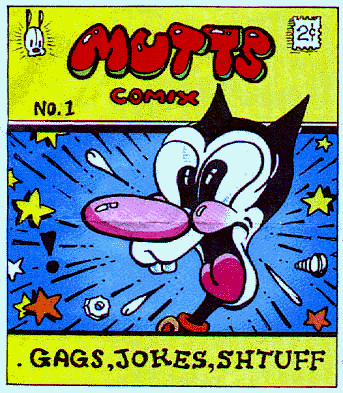I’m off getting a magical new hip that will allow me to leap tall buildings in a single bound. While I’m recuperating in a place of dubious connection, here’s an interview I did in 2003 for the Post-Star of Glens Falls, NY. The cartoons were added in 2010 when I replayed the interview for Comic Strip of the Day.
To begin with, the rotary dial telephone doesn’t really work.
But it’s not entirely out of place, there in the background of the picture, along with the analog clock. The candle, admittedly, is a bit of a stretch. Patrick McDonnell really does have electricity.
“The photographer went around and just collected some stuff for the background,” he explained.
McDonnell bought the old phone as a curiosity, not because he rejects modern technology.
And yet his comic strip, “Mutts,” is indeed done in pen and ink, and the Sunday strips are colored by hand.
McDonnell’s work is most often compared to’ George Herriman’s classic “Krazy Kat” comic strip, which began in 1916 and ran until just before World War II, and this is not a random association. McDonnell and his wife, Karen, collaborated on “Krazy Kat: The Art of George Herriman,” the definitive work on the artist.
McDonnell admits he’d be perfectly content with the level of technology that prevailed in Herriman’s day.
Despite the availability of computer-aided graphics favored by many of his contemporaries, he draws with the artistic equivalent of a rotary phone, or perhaps an even older model.
“I use a fountain pen dipped in a bottle of ink, working on paper I cut myself,” he said. “I like the craft of it. That’s why I always wanted to do this.”
If his work is done at the patient pace of an earlier age, his dream of being a working cartoonist became real with enviable speed. Although he expected to have to work for “some of the cheesier magazines” fresh out of school, his first job turned out to be illustrating Russell Baker’s column in the New York Times Magazine. He soon added a gig providing the art for Sports Illustrated’s “Scorecard” feature, and some characters who were regulars there for years became cast members of “Mutts” when he launched the strip in 1994.
His actual inspiration for the art form came from the generation after “Krazy Kat,” and from a person who both inspired and mentored many of his contemporaries.
“I’ve wanted to be a cartoonist for as long as I can remember, mostly because of ‘Peanuts,’ ” he said, “and the high point in my life was meeting Charles Schulz and having the privilege of getting to know him.”
Schulz, who died three years ago this month, was at once a prolific and painstaking cartoonist and a generous adviser to a host of young comic strip artists.
“I don’t know how he did it,” McDonnell marveled. “He always had time for you, even with all the other things he was doing, and not just his cartooning. He was always busy. He played senior league hockey, he did everything. I would love to know how he managed to make time for it all.”
McDonnell does make time for things that matter to him, however. Twice a year, he does strips to help promote animal shelters and animal adoption, he has donated art for various shelter and adoption fund-raising auctions, created art to promote spay-and-neuter programs and, in addition to the awards he has won for the comic strip, McDonnell has also been awarded a seat on the board of directors of the Humane Society of the United States.
In the latter case, at least, the recognition seems to spring not from any desire to gain it, but from his own sense of what he ought to be doing.
“The strip is about companion animals, after all, and I thought it was only fair,” he explains. “A lot of animals have it rough.”
Those matter-of-fact ethics are part of the low-key atmosphere of “Mutts,” a world which McDonnell tries to show through the animals’ point of view.
“I think that people who love it really love it, and that’s what matters to me,” he says. “It has its own sense of timing, and people get used to it. But it’s certainly not insulting, nasty humor. It’s just a strip about a cute little cat and dog.”
That’s enough for him.
“The world is pretty noisy,” he says. “I see ‘Mutts’ as kind of a rest stop.”





Cheap Thrills, a favorite album.
And ZAP Comix #2 for the top image.
Nice.
Yes, R. Crumb is certainly important there. Would sure like more underground coverage here…